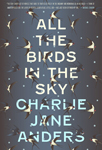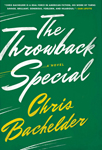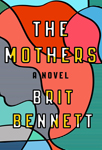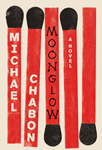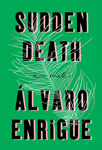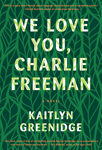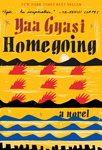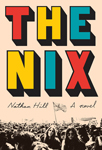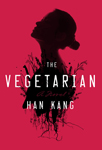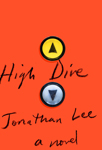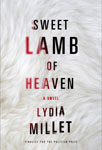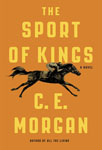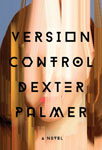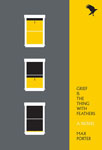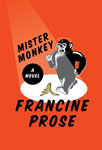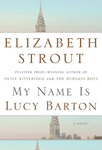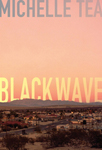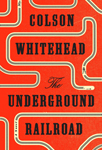by Charlie Jane Anders
Buy it at Powell’s »Kirstin Butler: The year now-late, especially in its latter half, was perverse with loss, an accumulation of affronts to both good sense and taste. It felt egregiously, almost epically bad. People (“people” being mostly editors of websites on the continental US coasts) started to ask, Was it the worst humans had ever seen? Historians proposed alternatives, but since no one had been around for the Black Death, it was impossible to confirm that we weren’t living through something singularly awful. By the end of 2016 I found myself even questioning the value of reading at all, which was embarrassing, given that I’m a writer and one of my jobs involves getting people hype about books.
Then I got my tournament assignment, which led me to consider the possibility that I, along with half of the nation, was just being trolled. As allegories for our present go, pairing The Underground Railroad with Black Wave was a little obvious. Just the one—a popular juggernaut about white supremacy—or the other—a drug-fueled, one-way trip to the apocalypse—sure, fine. But both together? I might as well just read the president’s Twitter. Oh well, I thought, cracking them open. At least my loss of faith in words meant I hadn’t read either yet.
I had avoided Colson Whitehead’s latest when it came out in August, in part because of the aforementioned literary acedia. Then there was the matter of my petty resentment, the pique I felt at all of his come-lately admirers. “I’ve been onto him since The Intuitionist,” I thought to myself, “way before his books had Oprah’s Good Housekeeping seal.” And then, “Oh God, this makes me sound like Franzen doesn’t it? Fuck!” Mostly, though, I really, really didn’t want to read about slavery. In 10th grade I took a class called “The African-American Experience” whose teacher, looking to make antebellum history come alive, conceived of an ill-advised LARPing exercise that scared me off of Old South narratives for the next two decades. (The same happened after I binge-watched Shoah during sophomore year of college. I didn’t go near another Holocaust story until Shalom Auslander.) I now understand the enormous moral abdication of my boycott, a willful amnesia I share with most Americans, but 14-year-old me was a delicate flower, OK?
Anyway, so successful was my personal moratorium on slave narratives that by the time I got to the part of The Underground Railroad where its heroine, the “runagate” Cora, and her companion Caesar arrive at the first of several stops on said railroad, which turns out to be an actual railroad—as in, a network of tracks with depots and station agents running them—I was genuinely unsure whether this development was faithful recreation or fabulist touch. I know, I’m horrified at myself too. Rather than linger on my shameful ignorance, though, consider that Whitehead made his counterfactuality so realistic (in the same way that dreams feel fully real as they’re happening) that I was driven to look up more about abolition on Wikipedia, like some kind of idiot. “The train lurched forward,” he writes after they board.
The runaways lost their balance and stumbled to the nest of hay bales that was to serve as seating. The boxcar creaked and shuddered. It was no new model, and on numerous occasions during their trip Cora feared it was on the verge of collapse. The car was empty apart from hay bales, dead mice, and bent nails. She later discovered a charred patch where someone had started a fire. … Cora looked through the slats. There was only darkness, mile after mile.
A key measure of a novel’s success, to my mind, is a sense of the inexorable. I want to feel like things could only happen in this particular way at this particular moment, so coherent is a book’s world. Whitehead has always been a master of the inevitable, that building of a book’s tension toward a single point of merciful, terrible relief. This is the man’s second novel about trains, after all, and is there any mode of transport with a more definitive terminus?
By contrast, then, a passage from the first section of Black Wave:
Tangents were Michelle’s favorite part of writing, each one a declaration of agency: I know I was going over there but now I’m going over here, don’t be so uptight about it, just come along. A tangent was a fuckup, a teenage runaway. It was a road trip with a full tank of gas. You can’t get lost if you don’t have anywhere to be. This was writing for Michelle: rule free, glorious, sprawling.
There goes narrative procedure, right out the window along with a Coke can and a cigarette butt. Tea drops us off in fin-de-siècle San Francisco as she, or rather “Michelle,” hooks up with a series of equally lost souls while high on an apothecary’s worth of drugs. Like most inebriated encounters, hers end in disaster, but she has no regrets. Rather, she wears her hookups and substance abuse on her sleeve, like a proper memoirist should. As she prepares to buy crack from a just-released con, she even instrumentalizes the moment: “It would be an experience, and Michelle was a writer.”
I spent the first two-thirds of Black Wave feeling seriously pissed about my reading assignment. It’s not that I’m tired of novels in the confessional mode, although I do think we’ve long turned the corner on eponymous protagonists—whether Heti, Knausgård, or Kraus—being “formally innovative,” as the jacket copy of Black Wave suggests. Dante marked that territory 20 years before the Black Death. I mean, I’ll admit that seeing the author’s name on her character list puts my inner critic on high alert: I guess I just believe anyone who attempts this gambit has a much higher formal bar to pass. If you’re drawing on your own diary for plot, then you better do so especially artfully in order to transcend wink-wink meta-narrative toward some greater meaning.
But where was I again? Oh right, pissed. See, for the most part these days I’m no longer a read-or-die chick, especially if the trip seems not to have an itinerary. Like one of publishing’s current animating spirits, Lisa Lucas, I won’t finish a book that hasn’t won me over once I’ve given it an honest chance.
When you’re comparing two books, though, you have to stick around, and in the case of Black Wave, I’m glad I did. Once “Michelle” leaves the Bay Area for LA with half-hearted goals of getting clean and writing a screenplay, the countdown to Armageddon starts and things get funnier and stranger. The prose takes on a loose, lyrical beauty that’s quite moving; the whole project starts to feel less like a memoir-qua-novel, but simply a means of getting at truths that neither genre, with its own limitations, can approach alone.
Back in 2012, a year that seems underappreciated in retrospect (and downright halcyon compared to the shit we’re in for now), the Pulitzer board decided not to issue a fiction prize. An outraged literati demanded answers and Michael Cunningham, jury member and former Pulitzer winner himself, provided them. Turned out it was the board, and not the jury putting the books forward, that had reached this partan-handed decision. What’s stayed with me from his non-mea culpa, though, is his description of reading The Pale King’s opening line after already finishing two other novel contenders. “It was a little like having heard a series of chamber pieces, and been pleased by them,” he wrote, “until the orchestra started in on Beethoven.”
I suppose what I’m trying to say, without being a dick about it, is that this matchup didn’t feel fair. First of all, The Underground Railroad and Black Wave are very different kinds of books. But where Tea made me smile wryly (a bunch of times!) The Underground Railroad regularly moved me to tears of both tragedy and joy.
In the end, Whitehead is just operating on another level here. The proof of his virtuosity may lie in how well this novel tricks the reader, in fact, into thinking it’s classical when what it’s actually playing at is jazz. For one thing, there are the fantasy trains. For another, each of his heroine’s layovers as she tries to outrun her past—in South Carolina, Tennessee, North Carolina, and finally Indiana—is actually a set piece for a different aspect of the African-American experience. It’s not that I wasn’t aware of how stylized these parables are; it’s that I saw the book’s score and then promptly forgot its notation. You can read The Underground Railroad and remain fully aware of its constructedness, or you can put those thoughts aside and give yourself over to its thrumming engine, its beating heart.
The two books do share a feature, however: They both make explicit appeals to reading’s importance in times of crisis. In Black Wave, “Michelle” spends the world’s final days and nights in a secondhand bookstore. And Cora, illiterate when we first meet her, eventually marvels at her access to the formerly unimaginable luxury of a library. Where she might once have been killed for reading its books, they’re now as familiar to her as family:
She recognized these stories as her own. They were the stories of all the colored people she had ever known, the stories of black people yet to be born, the foundations of their triumphs.
People had put all that down on paper in tiny rooms. Some of them even had dark skin like her. It put her head in a fog each time she opened the door. She’d have to get started if she was going to read them all.
I needed this message, in this particular way, at this particular moment. Of the unique salvation books can offer when the struggle is daunting, the truths behind them difficult and painful. Especially then. Those of us who have the great luck of being able to read forget this sometimes; both of these novels helped me to remember. Ultimately it was The Underground Railroad that most powerfully showed me how we’ve risen up before—and so shall we rise up again. If in the beginning, Whitehead seems to suggest, was the word, now the word is with us. No, more than that: The word is us.
Match Commentary
By Kevin Guilfoile & John Warner
Kevin Guilfoile: Before we get started, we have a special announcement. For the first time since the tournament started 13 years ago, TMN and the ToB need your support.
We’ll let Andrew and Rosecrans explain further. But please, if you enjoy the tournament, if you read TMN, check out the membership page and take 30 seconds to show some love. They can’t continue to do this without your assistance.
John Warner: Think of it as the ticket price for this month-long event. By becoming a Sustaining Member of TMN, you’ll make it possible to keep this crazy, lovely thing going—and not only keep it motoring, but enable it to grow bigger. Don’t worry, we’ll wait right here.
Kevin: OK then. When I first heard about the underground railroad (the historical escape route from slavery, not the novel) I too assumed it involved an actual train, and it took some amount of elementary school social studies deprogramming to disabuse me of the notion. I think this is an error made by a lot of Americans at some point, and Whitehead is able to co-opt this tendency toward literalness as a high-concept hook for his novel. Having done that, he might have chosen to put that titular transport to fanciful use, creating a Hogwarts Express-like magical freedom train running right under the feet of slave-holding southern Muggles. I don’t think Whitehead is necessarily too serious a novelist for that. He has, after all, previously written (quite brilliantly) about zombies and extra-sensory elevator inspectors.
I’m glad he didn’t. In his hands the premise remains utilitarian, with the railroad ferrying his characters through an anecdotal story that was riveting enough without embellishment. To do otherwise, in fact, would have cheated the story of its power—plenty of narratives over the years have softened the barbed edges of slavery. And it is critical that we continue to confront this part of our history.
I am writing this just hours after the United States Senate voted to place an overt and active racist in charge of voting and civil rights enforcement in this country. I am writing this just days after the President of the United States (and his chief spokesperson) made it clear they think Frederick Douglass is a living person of uncertain significance. I am writing this several weeks after having seen the Oscar-nominated documentary The 13th, which makes a powerful and convincing argument that 150 years after the Civil War, the US economy still profits in the billions from the enslavement of black men through mass incarceration. (If you are working your way through the Oscar-nominated films, do not neglect The 13th, which is on Netflix. It is a fucking punch in the gut.)
Ironically, we have arrived at another dark place in our nation’s history because large numbers of us have collectively ignored, dismissed, or chosen to be willfully ignorant of the dark places our country has been. Novels like Whitehead’s, which is engaging and page-turning, but also matter-of-fact about America’s sins, are urgently needed. There is no chance it will be read by the current president or his advisors or his attorney general, but such stories can be profound reminders about why we need to resist their dangerous and ignorant bullshit.
We are going to need guts like iron for all the punches we are about to take.
John: The ToB opening round often has these sorts of “mismatches” when a fierce little indie goes up against one of the big titles of the year, and just about every year, the fierce little indie, no matter how compelling, goes down in defeat.
Under normal circumstances, I root for the indie because this is where my own sentiments and works tend to lie, and Black Wave is a worthy competitor. As in Judge Butler’s case, it isn’t a book that’s normally in my wheelhouse, but it’s so closely observed that I found myself absorbed into “Michelle’s” world. In another year, it very well could’ve pulled off an upset, but as Judge Butler says, The Underground Railroad is on “another level.”
I too was on the Whitehead train (ha! ha!) from The Intuitionist. Last year, I said he was the best contender for the title of the “David Bowie of literature” and I named him co-winner of the entirely non-prestigious, but sincerely given Biblioracle Book of the Year award.
I can’t really do better than Butler in enumerating the book’s virtues. It is interesting how Trump’s rise casts books like The Underground Railroad in a different light: something like prophecy, but as you note, they are only prophecy to those of us who weren’t paying appropriate attention to the present.
In addition to all of the virtues already described, one of the most compelling aspects of the novel, for me, is Whitehead’s portrayal of Ridgeway, the slave catcher. It reminds me of something James Baldwin illuminated in his essay “The American Dream and the American Negro,” that the oppressor is also destroyed by the sin of racial prejudice.
Sheriff Clark in Selma, Ala., cannot be dismissed as a total monster; I am sure he loves his wife and children and likes to get drunk. One has to assume that he is a man like me. But he does not know what drives him to use the club, to menace with the gun and to use the cattle prod. Something awful must have happened to a human being to be able to put a cattle prod against a woman’s breasts. What happens to the woman is ghastly. What happens to the man who does it is in some ways much, much worse. Their moral lives have been destroyed by the plague called color.
Baldwin is not expressing sympathy for Sheriff Clark. This is a condemnation. Baldwin is not commenting on the virulence of the plague, but the weakness of the sheriff’s character. Electing Donald Trump was a failed test of character, with white Americans as the primary culprits.
Kevin: Baldwin is an appropriate cultural reference for Black Wave, as well, with its celebration (is that the right word? Sure.) of queer bohemianism in the first act.
Trump is also probably the correct cultural reference for the suddenly and unfortunately familiar wait for the apocalypse that unfolds in Black Wave’s final third.
No doubt this was a mismatch of sorts. The Underground Railroad is terrific and feels like the novel of the moment. Through no fault of hers, Tea’s personal metafiction seems to suffer from an ambition deficit when placed on the shelf next to it. It is in comparisons like these, however, that we find ourselves as readers. I think it’s extremely valuable to ask not just if you like a book, but why. Judge Butler gave Black Wave its due, and another critic, in another year, might have chosen differently. We will discover such judges in the comments below, no doubt.
Again, ToB fans, if you love the Rooster, please support TMN and the ToB as a Sustaining Member. It takes TMN a ton of production behind the scenes, for months on end, to produce the ToB, and they need your support. For pennies a day, you’ll truly make a difference.
Tomorrow, John, you and I get an unearned day off as Charlie Jane Anders’s All the Birds in the Sky meets Han Kang’s The Vegetarian. The judge in that match will be novelist V.V. Ganeshananthan, and we’ll have commentary from our first set of bookseller guests. Appropriately, we kick things off with Ashleigh Brantingham and D Lozano from our beloved books sponsor, Powell’s.
(Even though our mouths will be duct-taped for a day, I’m looking forward to that matchup, John. Both of those books are a trip.)



